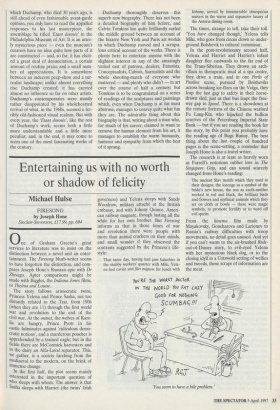Entertaining us with no worth or shadow of felicity
Michael Hulse
FIRES ONG by Joseph Hone Sinclair-Stevenson, £17.99, pp. 694 One of Graham Greene's great services to literature was to insist on the distinction between a novel and an enter- tainment. The Firesong blurb-writer seems to have forgotten the distinction, and com- pares Joseph Hone's Russian epic with Dr Zhivago. Apter comparisons might be made with Biggles, the Indiana Jones films, or Thelma and Louise.
The story follows aristocratic twins, Princess Yelena and Prince Sasha, not too distantly related to the Tsar, from 1906 (when they are 11) through the first world war and revolution to the end of the civil war. At the outset, the wolves of Kare- ha are hungry, Prince Pyotr in his castle fulminates against 'ridiculous demo- cratic notions', and a murderous poacher is apprehended by a trained eagle; but in the fields there are McCormick harvesters and in the dairy an Alfa-Laval separator. This, we gather, is a society lurching from the mediaeval to the modern, on the brink of immense change. In the first half, the plot seems mainly interested in the important question of who sleeps with whom. The answer is that Sasha sleeps with Harriet (the twins' Irish governess) and Yelena sleeps with Sandy Woodrow, military attaché at the British embassy, and with Johnny Quince, Ameri- can railway magnate, though lusting all the while for her own brother. But Firesong informs us that in those times of war and revolution there were people with more than animal crackers on their minds, and small wonder if they observed the contrasts suggested by the Princess's life- style:
That same day, having had jam kalachies in the shabby workers' quarter with Mild, Yele- na had caviar and filet mignon for lunch with Johnny, served by innumerable obsequious waiters in the warm and expansive luxury of the Astoria dining-room.
The times, strange to tell, take their toll. `You have changed though,' Yelena tells Mild, who goes from circus clown to under- ground Bolshevik to cultural commissar.
In the post-revolutionary second half, Yelena and Harriet and Harriet's infant daughter flee eastwards to the far end of the Trans-Siberian. They drown an arch- villain in therapeutic mud at a spa centre, they drive a train, and in one Perils of Pauline scene, pursued by Bolsheviks across breaking ice-floes on the Volga, they leap the last gap to safety in their horse- drawn sled, just as that bus leapt the free- way gap in Speed. There is a showdown at the remote fortress of the Chinese warlord Fu Lang-Kin, who hijacked the bullion reserves of the Petersburg Imperial State Bank — but if you are reading the book for the story, by this point you probably have the reading age of Bugs Bunny. The best thing about the last couple of hundred pages is the scene-setting, a reminder that Joseph Hone is also a travel writer.
The research is at least as heavily worn as Farrell's notorious rubber lore in The Singapore Grip, and can sound scarcely changed from Hone's reading:
The ancient Slav motifs which they used in their designs: the lozenge as a symbol of the bride's new house, the sun as earth-mother worked in red and black, the brilliant birds and flowers and mythical animals which they set on cloth or bowls — these were magic symbols, to promote fertility or to ward off evil spirits.
From the kinema film made by Mayakovsky, Goncharova and Larionov to Russia's railway difficulties with troop movements, no detail goes unused. And yet if you can't warm to the air-brushed Reds- out-of-Disney story, to evil-eyed Yelena with her mysterious black dog, or to the closing idyll in a Cotswold setting of wellies and tweeds, those scraps of information are the meat.
`You seem to have a bile problem.'


























































 Previous page
Previous page